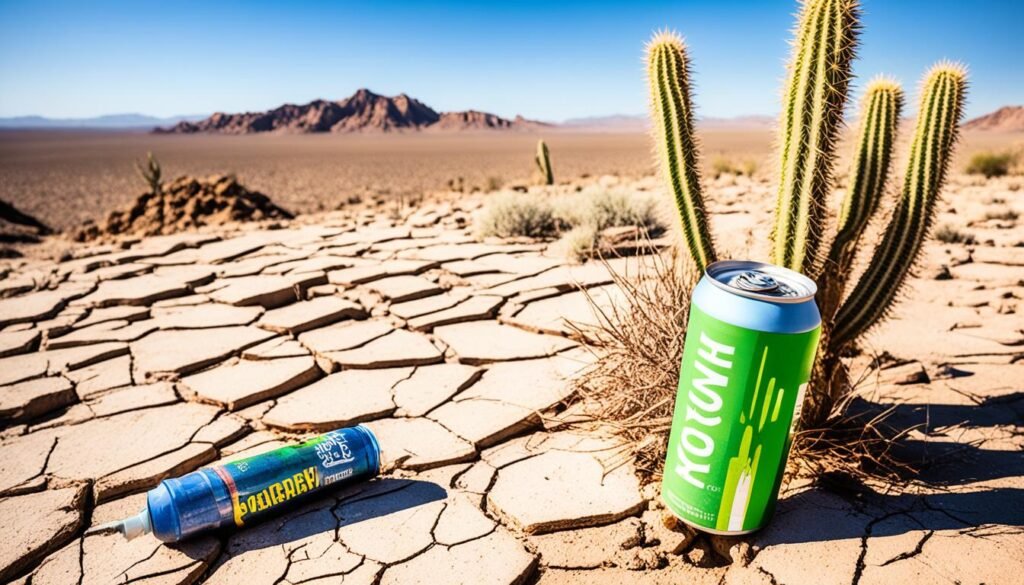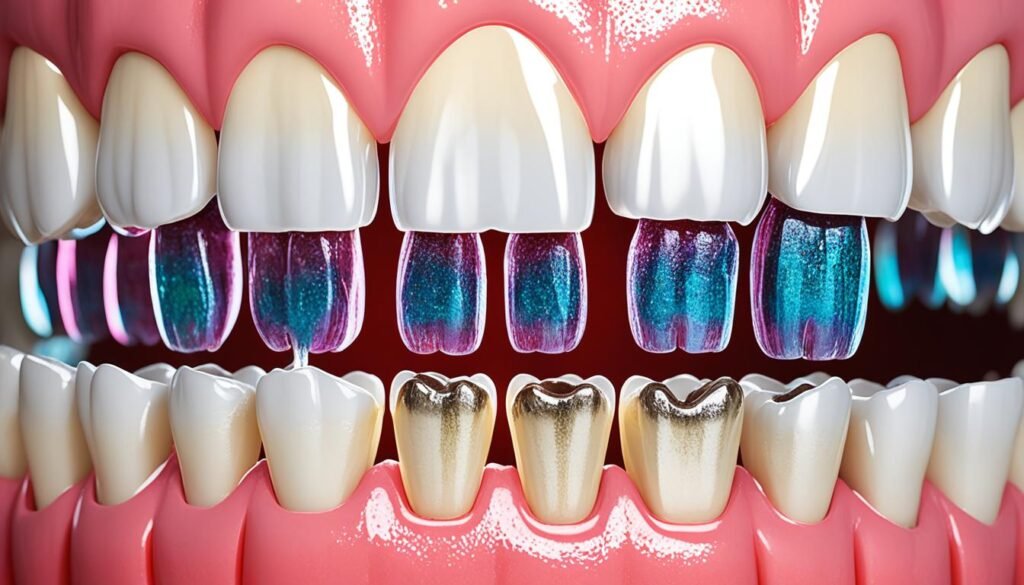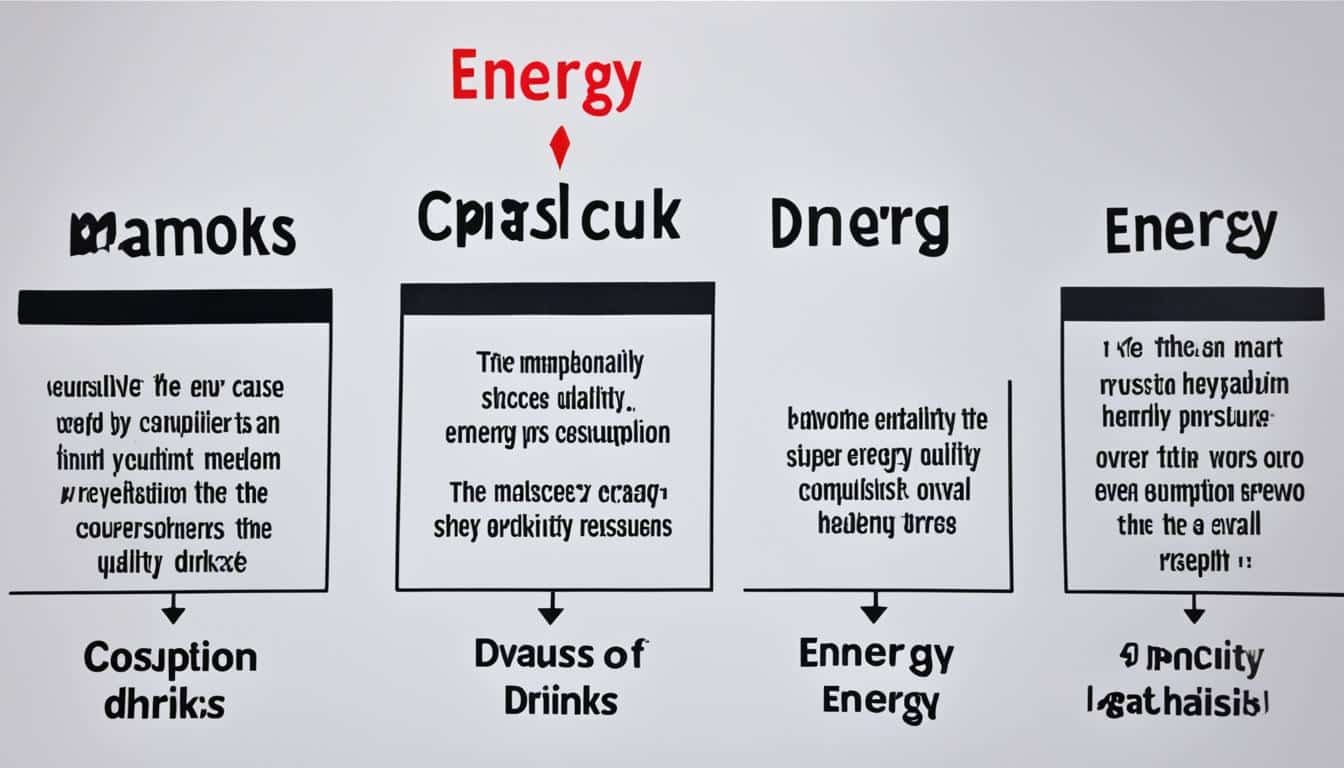Body Is Influenced By Energy drinks have become increasingly popular, with more than 3 in 10 young adults regularly consuming them. These beverages are high in caffeine and may also contain other stimulants like guarana, ginseng, taurine, and carnitine. Energy drink caffeine content can range from 80 to 200 milligrams per can, which is comparable to the caffeine content in coffee and espresso.
Additionally, energy drinks may be supplemented with nutrients, vitamins, minerals, antioxidants, adaptogens, and amino acids. However, it’s important to note that energy drinks are not regulated by the FDA, so the actual content of these ingredients may vary. The effects of energy drinks on the body can vary from improved alertness and mood to increased blood pressure, heart rate, and breathing. It’s crucial to be mindful of the potential health consequences associated with the consumption of energy drinks.
Key Takeaways:
- Energy drinks contain high levels of caffeine and may also contain other stimulants.
- The effects of energy drinks on the body can range from improved alertness to increased blood pressure.
- Energy drinks are not regulated by the FDA, so the actual content of ingredients may vary.
- It’s important to be mindful of the potential health consequences associated with energy drink consumption.
- Regular and excessive intake of energy drinks can have adverse effects on health.
The Impact of Caffeine in Energy Drinks
Caffeine is one of the primary ingredients in energy drinks and is known for its stimulating effects on the central nervous system. The caffeine content in energy drinks can range from 80 to 200 milligrams, which is similar to coffee and espresso. Caffeine acts as a mild stimulant, improving alertness, mood, reaction time, and physical endurance.
However, the impact of caffeine can vary from person to person, depending on their tolerance and sensitivity. It’s important to note that high levels of caffeine consumption can lead to dehydration, stomach problems, and even withdrawal headaches.
A recommended daily limit for caffeine intake is 400 milligrams, and it’s essential to be mindful of the total caffeine consumption from all sources, including coffee, tea, soda, and chocolate.
The Role of Sugar in Energy Drinks
Many energy drinks are sweetened with sugar or artificial sweeteners. The sugar content in energy drinks can vary, but most of them meet or exceed the recommended daily allowance for added sugar, which is 24 grams for women and 36 grams for men.
Consuming excessive amounts of sugar can have negative effects on your health. When you consume a drink high in sugar, it can lead to a rapid spike in blood sugar levels, followed by a crash. This can result in feelings of fatigue and may have long-term consequences for your health.
It’s essential to be mindful of the sugar content in energy drinks and consider sugar-free alternatives to minimize the potential negative effects of added sugars.
The Effects of Sugar in Energy Drinks
The high sugar content in energy drinks can have several effects on the body:
- Increased risk of weight gain and obesity
- Elevated blood glucose levels
- Higher risk of developing type 2 diabetes
- Potential negative impact on oral health, contributing to tooth decay and cavities
By choosing sugar-free energy drinks or reducing your overall consumption of energy drinks, you can lower your sugar intake and potentially reduce the risk of these health concerns.
Sugar Content in Popular Energy Drinks
Here is a comparative table showcasing the sugar content in popular energy drinks:
| Energy Drink | Sugar Content per Serving |
|---|---|
| Red Bull | 27g |
| Monster Energy | 54g |
| Rockstar Energy | 31g |
| Full Throttle Energy | 58g |
| NOS Energy | 52g |
“Consuming high amounts of added sugars, such as those found in energy drinks, can contribute to various health issues. It’s important to be aware of the sugar content and consider healthier alternatives.”
In conclusion, the sugar content in energy drinks can be high and may have negative effects on your health. By being mindful of the sugar content and considering sugar-free alternatives, you can make healthier choices and reduce the potential risks associated with consuming excessive amounts of added sugars.
The Potential Health Risks of Energy Drinks
The consumption of energy drinks has been associated with a range of potential health risks. Research has shown that high caffeine intake can increase blood pressure, heart rate, and breathing, which can be particularly dangerous for individuals with underlying cardiovascular conditions. Energy drinks have also been linked to adverse cardiovascular events, including atrial fibrillation, myocardial infarction, coronary artery vasospasm, and hypercoagulability. In addition to cardiovascular effects, energy drinks can cause symptoms of caffeine dependence, increased risk of violence and conduct disorder in adolescents, epileptic seizures and ischemic strokes, and even psychological symptoms like anxiety and psychosis-like experiences. It’s crucial to be aware of the potential health risks and consider moderation or alternative options.
Adverse Cardiovascular Events Associated with Energy Drinks
| Health Effects | Adverse Cardiovascular Events |
|---|---|
| Increased blood pressure | Atrial fibrillation |
| Increased heart rate | Myocardial infarction |
| Increased breathing rate | Coronary artery vasospasm |
| Hypercoagulability |
As shown in the table above, energy drinks can have adverse cardiovascular effects, ranging from increased blood pressure and heart rate to more severe events such as atrial fibrillation and myocardial infarction. These adverse effects can pose a significant risk, especially for individuals with pre-existing cardiovascular conditions. It’s important to consider the potential adverse effects of energy drinks and make informed decisions regarding their consumption.
“The high caffeine content in energy drinks can increase the risk of adverse cardiovascular events, making the consumption of these beverages potentially dangerous for individuals with underlying cardiovascular conditions.”
In addition to adverse cardiovascular events, energy drinks may also lead to caffeine dependence and psychological symptoms like anxiety and psychosis-like experiences. It’s important to recognize and address these potential health consequences associated with the frequent and excessive consumption of energy drinks.
- Caffeine dependence
- Increased risk of violence and conduct disorder in adolescents
- Epileptic seizures and ischemic strokes
- Psychological symptoms like anxiety and psychosis-like experiences
Understanding the potential health risks of energy drinks is essential for making informed decisions about their consumption. Considering moderation, alternative options, and prioritizing overall well-being can help minimize negative health effects and promote a healthier lifestyle.

The Influence of Energy Drinks on Physical Performance
Energy drinks are a popular choice for individuals looking to enhance their physical performance and experience an energy boost. Research suggests that the caffeine content in energy drinks can have positive effects on alertness, reaction time, and endurance, making them a favorite among active individuals.
However, it is important to note that the specific effects of energy drinks on physical performance can vary depending on the individual and their tolerance to caffeine. Additionally, relying solely on energy drinks for energy and physical performance can lead to a dependence on them and the potential need for higher doses to achieve the same effects.
It is worth mentioning that the positive effects on physical performance associated with energy drinks may not solely be attributed to caffeine. Other ingredients like taurine and amino acids found in these drinks may also contribute to the perceived benefits.
Instead of solely relying on energy drinks, it is crucial to consider alternative ways to enhance energy and physical performance. Optimizing sleep, staying hydrated, and consuming foods that support overall well-being are all effective methods to naturally boost energy levels and improve physical performance.
It’s important to maintain a balanced and holistic approach to physical performance, taking into account different lifestyle factors and considering the long-term effects on overall well-being.
Benefits of Alternative Methods for Improving Physical Performance
Optimizing sleep: Getting adequate restful sleep allows the body to recover and recharge, leading to improved physical performance. Quality sleep enhances cognitive function, reaction time, and muscle recovery.
Staying hydrated: Proper hydration is essential for athletic performance. Drinking enough water before, during, and after physical activity helps maintain optimal body temperature, lubricates joints, and supports overall performance.
Consuming nutrient-dense foods: Fueling the body with a balanced diet rich in fruits, vegetables, whole grains, and lean proteins provides the necessary nutrients for energy production, muscle repair, and overall physical well-being.
Engaging in physical activity: Regular exercise and physical activity have numerous benefits, including improved cardiovascular health, increased endurance, and enhanced muscular strength and flexibility.
| Methods to Enhance Physical Performance | Benefits |
|---|---|
| Optimizing sleep | Improved cognitive function, reaction time, and muscle recovery |
| Staying hydrated | Optimal body temperature maintenance, joint lubrication, and overall performance support |
| Consuming nutrient-dense foods | Energy production, muscle repair, and overall physical well-being |
| Regular physical activity | Enhanced cardiovascular health, increased endurance, and improved muscular strength and flexibility |

By focusing on these alternative methods, individuals can optimize their physical performance in a sustainable and healthy way without relying solely on energy drinks.
The Impact of Energy Drinks on Sleep
Consuming energy drinks, especially in the evening or close to bedtime, can disrupt sleep patterns and lead to trouble sleeping. The high caffeine content in energy drinks is a known stimulant that can interfere with the natural sleep-wake cycle. Caffeine can stay in the body for several hours, making it challenging to fall asleep or stay asleep. Additionally, frequent reliance on energy drinks to combat fatigue may indicate an underlying sleep deprivation issue that needs to be addressed through healthy sleep hygiene practices.
It’s important to avoid consuming energy drinks close to bedtime and prioritize adequate sleep for overall well-being.

| Effects on Sleep | Impact on Sleep Quality | Sleep Deprivation | Sleep Disturbance |
|---|---|---|---|
| Disrupted sleep patterns | Poor sleep quality | Increased risk of sleep deprivation | Heightened sleep disturbance |
| Interference with natural sleep-wake cycle | Difficulty falling asleep or staying asleep | Reduced duration and quality of sleep | Increased likelihood of waking up during the night |
| Elevated arousal and alertness levels | Impaired REM (rapid eye movement) sleep | Excessive daytime sleepiness | Restless or fragmented sleep |
The Impact of Energy Drinks on Hydration
Energy drinks can have a diuretic effect on the body, which means they can increase urine production and potentially lead to dehydration. The caffeine content in energy drinks is primarily responsible for this diuretic effect. It’s essential to be mindful of hydration status and drink water alongside energy drinks to maintain proper fluid balance. This is particularly important for individuals engaging in physical activity or spending time in hot climates, as these factors can further increase the risk of dehydration. It’s recommended to prioritize water consumption and limit reliance on energy drinks for hydration purposes.

The Impact of Energy Drinks on Oral Health
Energy drinks can have a detrimental impact on oral health, leading to dental erosion and an increased risk of dental caries (cavities). These popular beverages contain high levels of sugar and acids that can contribute to tooth decay and erosion of the tooth enamel. The acidic nature of energy drinks can also result in heightened tooth sensitivity.
To maintain good oral health, it is crucial to practice proper oral hygiene habits. Regular brushing, flossing, and dental check-ups are essential in preventing dental issues caused by energy drink consumption. Limiting the intake of energy drinks or opting for sugar-free alternatives can also help minimize the negative effects on oral health.

The Link Between Energy Drinks and Dental Erosion
Dental erosion occurs when the outer layer of the tooth enamel is worn away by the acids in energy drinks. The high acid content in these beverages, combined with the frequency and duration of consumption, can contribute to the erosion of tooth enamel over time. This can lead to tooth sensitivity, discoloration, and an increased risk of cavities.
The prolonged exposure to acidic drinks can have a more pronounced effect on oral health than the amount of sugar consumed alone. While sugar-free energy drinks may seem like a healthier alternative, their acidic properties can still pose a risk to tooth enamel.
The Role of Sugar in Dental Caries
The high sugar content in energy drinks plays a significant role in the development of dental caries. When sugar is consumed, it combines with bacteria in the mouth to form acids that attack the tooth enamel. Over time, the repeated exposure to these acids can lead to the formation of cavities.
It’s important to note that the sugar content in energy drinks often exceeds the recommended daily allowance for added sugars. Excessive sugar consumption not only contributes to dental caries but can also have negative effects on overall health.
Practicing Proper Oral Hygiene
To minimize the negative impact of energy drinks on oral health, it is essential to practice proper oral hygiene habits. This includes:
- Brushing teeth at least twice a day with fluoride toothpaste
- Flossing daily to remove plaque and food particles between teeth
- Scheduling regular dental check-ups and cleanings
By following these oral hygiene practices, individuals can help maintain healthy teeth and gums, reducing the risk of dental issues associated with energy drink consumption.
“Proper oral hygiene habits, such as regular brushing, flossing, and dental check-ups, are crucial in preventing dental problems resulting from energy drink consumption.”
The table below showcases the effects of energy drinks on oral health:
| Effects of Energy Drinks on Oral Health | Description |
|---|---|
| Dental Erosion | High acid content leads to enamel erosion and tooth sensitivity |
| Dental Caries | High sugar content contributes to the development of cavities |
| Tooth Sensitivity | Acidic nature of energy drinks can cause increased tooth sensitivity |
By being aware of the potential risks to oral health and implementing proper oral hygiene practices, individuals can take steps to mitigate the negative impact of energy drinks on their teeth and gums.
Alternative Ways to Boost Energy
Instead of relying on energy drinks for an energy boost, there are several alternative ways to enhance energy levels and well-being. Prioritizing optimal sleep, engaging in regular physical activity, and maintaining proper hydration can all contribute to increased energy levels.
Getting enough sleep is essential for restoring energy levels and promoting overall health. Aim for 7-9 hours of quality sleep each night to optimize rest and rejuvenation. Create a comfortable sleep environment, establish a consistent bedtime routine, and limit exposure to electronic devices before bed.
Also Read:- Fueling Fitness: How Energy Drinks For workout Can Boost Your Exercise Intensity
Regular physical activity is another effective way to boost energy naturally. Engaging in exercises that elevate your heart rate and increase circulation can enhance energy levels, improve mood, and increase overall stamina. Aim for at least 150 minutes of moderate-intensity aerobic activity, such as brisk walking or cycling, each week.
Proper hydration is crucial for maintaining optimal energy levels. Dehydration can lead to fatigue and decreased cognitive function. Aim to drink at least 8 cups (64 ounces) of water per day, or more if you engage in strenuous physical activity or are in a hot environment.
In addition to optimizing sleep, physical activity, and hydration, fueling your body with nutrient-dense foods can provide a sustainable energy boost. Choose foods that are high in complex carbohydrates, lean proteins, and healthy fats. Incorporate fruits, vegetables, whole grains, and sources of protein into your meals and snacks throughout the day to support sustained energy.
Getting outside and exposing yourself to natural light can also increase alertness and improve energy levels. Spend time outdoors each day, especially in the morning, to help regulate your internal body clock and enhance your mood.
Practicing deep breathing techniques, such as diaphragmatic breathing or yoga, can help reduce stress and increase oxygen levels in the body, boosting energy and promoting relaxation.
By adopting these alternative methods to boost energy, you can enhance your overall well-being and avoid the potential negative effects associated with energy drink consumption.
Conclusion
Energy drinks can provide a temporary boost in alertness and physical performance due to their caffeine content. However, it’s crucial to be aware of the potential health risks associated with their consumption. Regular and excessive intake of energy drinks can lead to increased blood pressure, heart rate, and breathing, potentially causing adverse cardiovascular events. The high sugar content in energy drinks can also contribute to negative health effects and increased risk of dental issues.
It’s important to prioritize moderation when consuming energy drinks and consider alternative ways to boost energy. Optimal health and wellness should be prioritized, taking into account overall well-being. This includes getting adequate sleep, engaging in regular physical activity, and maintaining proper hydration. By focusing on these factors, individuals can enhance their energy levels in a sustainable and healthy manner.
When it comes to energy drinks, it’s crucial to make informed choices and consider the potential consequences on our health. By being mindful of the caffeine and sugar content, as well as the potential adverse effects, individuals can make decisions that support their long-term well-being. Prioritizing a balanced lifestyle, moderation, and incorporating natural energy-boosting techniques can lead to optimal health and wellness.
FAQs
Q: What are the potential adverse effects of energy drinks?
A: Potential adverse effects of energy drinks include increased heart rate and blood pressure, disrupted sleep patterns, anxiety, digestive issues, and potential cardiovascular issues.
Q: How do energy drinks affect energy levels over a 24-hour period?
A: Energy drinks can cause a quick energy boost due to the caffeine and sugar content. However, this is often followed by a crash in energy levels once the stimulant effects wear off, leading to fatigue and decreased alertness.
Q: What are the effects of caffeine and taurine in energy drinks?
A: Caffeine and taurine are stimulants commonly found in energy drinks. They can enhance alertness and improve physical performance, but excessive consumption can lead to negative health effects on the cardiovascular system and overall wellbeing.
Q: How do energy drinks impact the cardiovascular system?
A: The high caffeine content in energy drinks can lead to increased heart rate, blood pressure, and potential adverse effects on the heart, especially when consumed in excessive amounts or in combination with other stimulants.
Q: What are the acute effects of consuming an energy drink?
A: The acute effects of consuming an energy drink include increased alertness, enhanced physical performance, and potential negative effects on the cardiovascular system such as altered heart rate and blood pressure.
Q: What amount of caffeine is typically found in energy drinks?
A: Energy drinks can contain varying amounts of caffeine, typically ranging from 80mg to 300mg per serving, or even higher in some extreme cases.
Q: How does overconsumption of energy drinks impact the body?
A: Overconsumption of energy drinks can lead to potential adverse effects on the cardiovascular system, disrupted sleep patterns, increased anxiety, and digestive issues. It can also contribute to excessive caffeine intake, leading to dependency and withdrawal symptoms.





